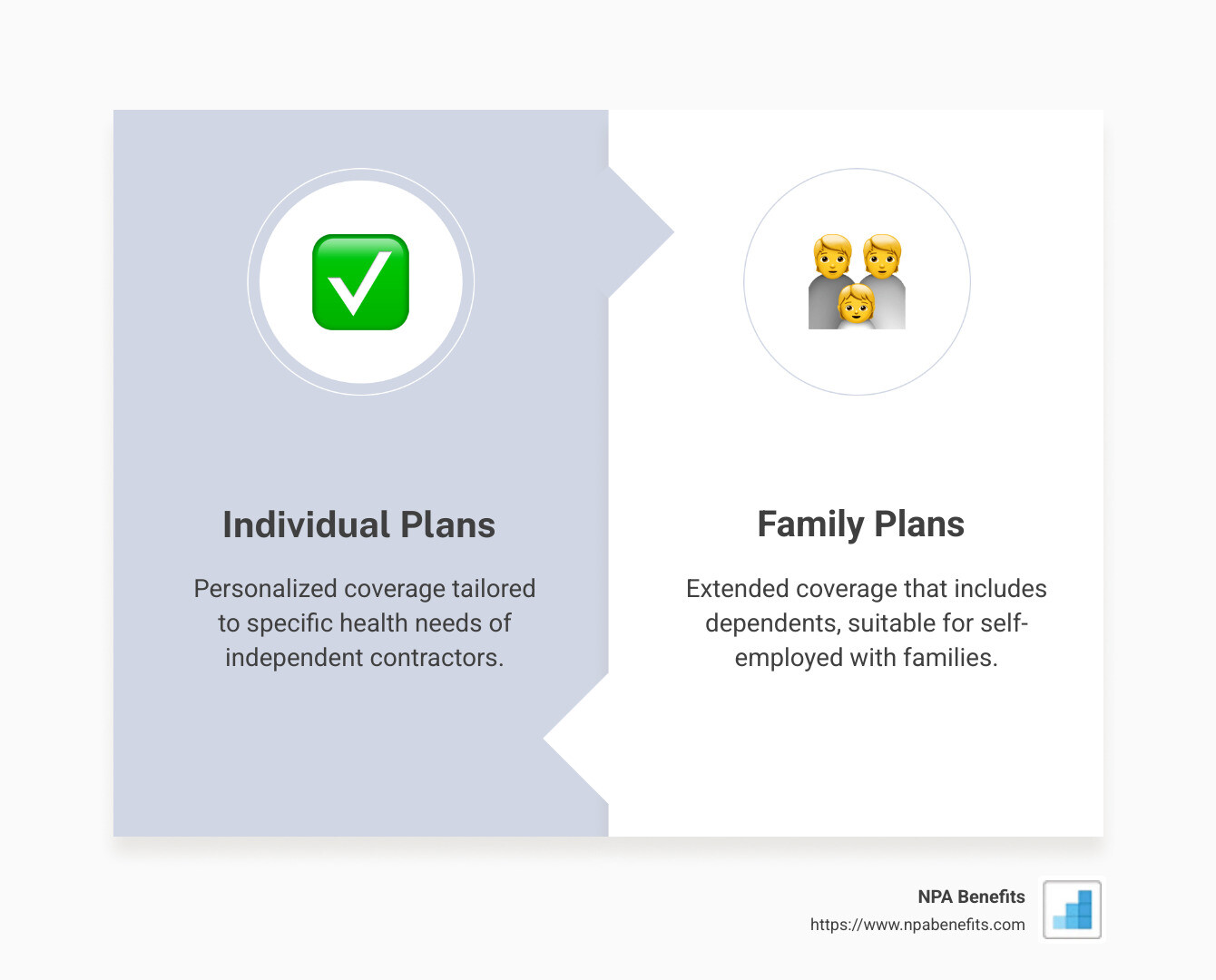Best health insurance for independent contractor can be a daunting topic for those venturing into self-employment. Yet, finding the right fit for your healthcare needs doesn’t have to be overwhelming. Understanding your options is crucial, whether you’re a freelancer, a gig worker, or a small business owner. Here’s a snapshot of the top health insurance choices for independent contractors:
- Individual Plans: Personalized coverage custom to your specific health needs.
- Family Plans: Extended coverage that includes your dependents.
- ACA Marketplace Plans: Access to a range of options with added benefits like premium tax credits and cost-sharing reductions.
Navigating the complexities of health insurance as an independent contractor involves looking beyond traditional plans. Exploring options like the ACA Marketplace and understanding the associated tax advantages can significantly impact your healthcare spending and provide peace of mind.
As someone immersed in the insurance industry for years, I, Les Perlson, have helped many self-employed individuals find the best health insurance for independent contractor that suits their unique situations. With this guide, I’m here to help you explore and understand your options.

Simple guide to best health insurance for independent contractor terms:
– average cost of healthcare for employers
– employer healthcare cost trends
– employer strategies for reducing healthcare costs
Understanding Health Insurance for Independent Contractors
For independent contractors, navigating health insurance can feel like a maze. But don’t worry, it’s simpler than you think. Let’s break it down.
Self-Employed and Health Insurance
Being self-employed means you’re in charge of your own benefits, including health insurance. Unlike traditional employees, you don’t have an employer-sponsored plan. This means you have to find your own coverage, which can be both a challenge and an opportunity to tailor your health insurance to your specific needs.
The Health Insurance Marketplace
Enter the Health Insurance Marketplace, a platform created by the Affordable Care Act (ACA). This is where you can shop for and compare different health insurance plans. It’s a one-stop shop for finding the coverage that fits your lifestyle and budget. The ACA Marketplace offers a range of plans, each categorized into metal levels: Bronze, Silver, Gold, and Platinum. These levels help you understand the balance between monthly premiums and out-of-pocket costs.
Metal Levels Explained
-
Bronze Plans: These have the lowest monthly premiums but come with higher deductibles and out-of-pocket costs. They’re great if you want to keep your monthly expenses low and don’t expect to need much medical care.
-
Silver Plans: A middle-ground option with moderate premiums and deductibles. Silver plans are also the only ones eligible for cost-sharing reductions, which can lower your out-of-pocket costs if you qualify.
-
Gold Plans: Higher premiums but lower deductibles and out-of-pocket costs. These are ideal if you anticipate needing more medical care and want to minimize out-of-pocket expenses.
-
Platinum Plans: The highest premiums but the lowest out-of-pocket costs. These plans are best if you need frequent medical care and want to avoid high costs when you do.

Why Metal Levels Matter
Choosing the right metal level is crucial. It affects how much you pay each month and what you’ll pay when you need care. For many self-employed individuals, understanding these options means more control over healthcare costs and better financial planning.
ACA Benefits for Independent Contractors
The ACA doesn’t just offer a variety of plans; it also provides financial assistance. Premium tax credits can significantly reduce your monthly premiums if you qualify based on your income. Additionally, cost-sharing reductions are available for those who choose Silver plans, further lowering costs for eligible individuals.
For independent contractors, the ACA Marketplace is a vital resource. It offers flexibility, choice, and potential savings—key factors when you’re navigating health insurance on your own.
Next, let’s dive into the best health insurance options specifically custom for independent contractors.
Best Health Insurance for Independent Contractors
When you’re self-employed, finding the best health insurance for independent contractors is essential. It not only protects your health but also your finances. Let’s explore the options available, including individual and family plans, as well as financial assistance like premium tax credits and cost-sharing reductions.
Individual and Family Plans
Individual Plans: These are designed for just you, covering your personal healthcare needs. They’re ideal if you’re single or prefer separate coverage from your family. Individual plans can be customized based on your health needs and budget.
Family Plans: If you have dependents, family plans might be your best bet. They cover you and your loved ones under one policy, which can be more convenient and sometimes more economical than individual plans for each family member.
Financial Assistance: Premium Tax Credits and Cost-Sharing Reductions
Premium Tax Credits: These are a game-changer for many independent contractors. Depending on your income, you might qualify for these credits, which lower your monthly premium costs. This means you can afford better coverage without breaking the bank.
Cost-Sharing Reductions (CSRs): If you opt for a Silver plan, you might also be eligible for CSRs. These further reduce your out-of-pocket expenses like deductibles and copayments. It’s an extra layer of financial protection for those who qualify.

Choosing the Right Plan
Selecting the right plan involves balancing your healthcare needs with your budget. Here’s a quick guide:
- Bronze Plans: Low premiums, high out-of-pocket costs. Good if you’re healthy and rarely need care.
- Silver Plans: Moderate premiums and costs. Best if you qualify for CSRs.
- Gold Plans: Higher premiums, lower out-of-pocket costs. Ideal if you expect to need more healthcare services.
- Platinum Plans: Highest premiums, lowest costs. Best if you require frequent medical care.
The key is to assess your healthcare needs and financial situation. Use the ACA Marketplace to compare options and see if you qualify for any financial assistance. This way, you can find the best health insurance for independent contractors that suits your lifestyle and budget.
Next, we’ll look at the top coverage options for self-employed individuals, diving deeper into the specifics of each plan type.
Top Coverage Options for Self-Employed Individuals
When you’re self-employed, choosing the right health insurance plan is crucial. The Health Insurance Marketplace offers four main types of plans: Bronze, Silver, Gold, and Platinum. Each has its own balance of premiums and out-of-pocket costs. Let’s break them down:
Bronze Plans
Bronze Plans have the lowest monthly premiums but come with the highest out-of-pocket costs. They’re a good choice if you’re generally healthy and don’t expect to need much medical care. With lower monthly payments, you can keep more money in your pocket each month, but be prepared to pay more if you need medical services.
Silver Plans
Silver Plans offer a middle ground with moderate premiums and out-of-pocket costs. If you qualify for cost-sharing reductions (CSRs), Silver plans become even more attractive. CSRs can significantly lower your deductibles and copayments. For many, this makes Silver plans the best health insurance for independent contractors seeking a balance between cost and coverage.
Gold Plans
Gold Plans come with higher monthly premiums but lower out-of-pocket costs. They’re ideal if you expect to use healthcare services more frequently. With a Gold plan, you pay more upfront each month, but save on each doctor’s visit or medical procedure. This can be a smart choice if you have ongoing medical needs.
Platinum Plans
Platinum Plans have the highest premiums but the lowest out-of-pocket costs. They’re designed for those who require frequent medical care. If you have chronic conditions or anticipate significant healthcare needs, a Platinum plan might offer the best value. You pay more each month but enjoy the peace of mind knowing your costs are minimized when you access care.
Making Your Choice
Choosing between these plans depends on your health needs and financial situation. Use the Marketplace to compare your options and see if you qualify for financial assistance like premium tax credits or CSRs. This way, you can select the plan that best aligns with your lifestyle and budget.
Next, we’ll guide you through the enrollment process, including important timelines and special circumstances that might affect your coverage options.
How to Enroll in Health Insurance Plans
Enrolling in health insurance as an independent contractor involves understanding key periods and events that affect your ability to get coverage. Let’s explore the details.
Open Enrollment Period
The Open Enrollment Period (OEP) is your main window to sign up for a health insurance plan through the Health Insurance Marketplace. This period usually runs from November 1 to January 15 in most states. During this time, you can explore different plans, compare costs, and select the best health insurance for independent contractors that fits your needs and budget.
Tip: Mark your calendar! Missing this window means you might have to wait another year to enroll unless you qualify for a Special Enrollment Period.
Special Enrollment Period
If you miss the OEP, don’t worry. Certain life changes might qualify you for a Special Enrollment Period (SEP). This is a unique opportunity to enroll in or change your health insurance plan outside the standard enrollment dates.
Qualifying Life Events
To access a SEP, you need to experience a qualifying life event. These events include:
- Getting married
- Having a baby or adopting a child
- Losing other health coverage (like losing a job or aging out of a parent’s plan)
- Moving to a new residence
When a qualifying life event occurs, you typically have 60 days from the event to enroll in a new plan. This ensures you maintain continuous coverage without a gap.
Remember: Always have documentation ready to prove your qualifying life event, as this will be required during the enrollment process.
Understanding these enrollment periods and life events helps you stay covered as an independent contractor. Next, we’ll tackle some frequently asked questions about health insurance for independent contractors, providing you with the insights you need to make informed decisions.
Frequently Asked Questions about Health Insurance for Independent Contractors
How much is health insurance for an independent contractor?
The cost of health insurance for independent contractors can vary widely. Factors influencing the cost include your age, location, and the type of plan you choose. For example, in 2023, the average cost of a marketplace plan without subsidies was around $477 per month for a Silver plan. However, if you’re eligible for tax subsidies, your costs could be significantly lower.
Location plays a crucial role. Health insurance premiums can vary from state to state. For instance, a plan in California might cost more than a similar plan in Texas due to different healthcare regulations and market conditions.
What do self-employed people use for health insurance?
Many self-employed individuals and independent contractors turn to specialized health insurance providers to find coverage. These providers offer a range of individual plans and family plans that cater to different needs and budgets. Plans are often categorized into different levels, each with varying premiums and out-of-pocket costs.
Some self-employed people also explore alternatives like joining membership organizations that provide health insurance options. These can sometimes offer more affordable coverage but often come with different rules and limitations compared to traditional plans.
Can self-employed individuals deduct the cost for health insurance?
Yes, self-employed individuals can often deduct health insurance premiums from their adjusted gross income. This deduction is available for premiums paid for medical, dental, and long-term care insurance for themselves, their spouse, and dependents.
To qualify for this deduction, you must not have access to an employer-sponsored health plan, either through your own or your spouse’s employer. Additionally, the deduction can’t exceed your earned income from the business under which the insurance plan is established.
Premium Tax Credits can also help lower monthly premiums for those who qualify. These credits are based on your income and family size, making it more affordable to maintain coverage. These credits are reconciled on your tax return, so report any changes in income or household size to the appropriate provider promptly.
Conclusion
Navigating health insurance as an independent contractor can feel overwhelming. But with the right resources and guidance, you can find a plan that fits your needs and budget. NPA Benefits stands out by offering flexible options that prioritize control and cost-saving for both individuals and businesses.
Choosing the best health insurance for independent contractors involves understanding the various plans available and how they align with your personal and financial needs. At NPA Benefits, we provide a range of self-funded health insurance plans designed to give you the power to tailor your coverage. This means you can decide how much to contribute and which expenses to cover, ensuring your health benefits work for you.
Control is at the heart of what we offer. You get to choose how to manage your health insurance, making it a perfect fit for your lifestyle as an independent contractor. Plus, by using pre-tax dollars for eligible healthcare expenses, you can effectively lower your taxable income, leading to potential tax savings.
With NPA Benefits, you’re not just choosing a health insurance plan; you’re choosing a partner dedicated to your health and financial well-being. Our expertise and resources are here to simplify the process, from selecting the right plan to understanding reimbursements.
Take control of your healthcare spending with NPA Benefits, and enjoy the peace of mind that comes with knowing you have a plan custom to your needs. Accept the flexibility, enjoy the savings, and take control with NPA Benefits.






